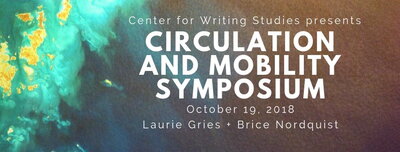

Symposium on Circulation and Mobility
Brice Nordquist and Laurie Gries
October 19, 2018
***
Methodological Workshops: 10.00a-12.00p
Methodological workshops will take place in the morning. Participants can register via Google Form.
Brice Nordquist, "Go-Along Methods: Affordances and Limitations"
In the decades since Law and Urry (2004) proclaimed “orthodox” social science methods insufficient for dealing with fleeting, sensory, emotional, and kinaesthetic dimensions of practice, many in literacy and writing studies have developed and refined multimodal and mobile methodologies attentive to phenomena that “overflow” our abilities of apprehension and representation. However, we still have much to learn about how affective, emotional, and sensory experiences shape and are shaped by literacy practice. This workshop focuses on the affordances and limitations of go-along methods (Kusenbach, 2003) for accessing and reflecting on fleeting, relational, and felt aspects of mobile literacies resistant to representation.
Laurie Gries, "Iconographic Tracking"
In this workshop, Laurie Gries will provide a step-by-step account of how to do iconographic tracking-a digital research method for tracing how images, circulate, transform, and become consequential with time and space. Participants can expect to walk away with a handout delineating these steps that can be used for research and/or teaching. Participants will also get a quick sense of doing iconographic tracking by participating in a collective exercise tracking the image of Malala Yousafzai, a Pakistani activist for female education and Nobel Prize winner whose image, as of late, has become a cultural icon experiencing widespread circulation and rhetorical transformation across the globe.
Public Talks: 1.30p-3.30p
Below are talk abstracts for Dr. Nordquist and Dr. Gries's talks.
New Materialist Autobiography: A Multi-Sensory Approach for Studying Rhetorical Entanglements and the Ontology of Becoming (Laurie Gries, University of Colorado Boulder)
Abstract: In this talk, Laurie Gries discusses and models the affordances of new materialist autobiography (NMA), an in situ, experimental research method that attunes writers to our affective, persuasive encounters with the things around us. As a method, NMA studies how non-human entities in our surrounding environment trigger affective, cognitive, emotional, and physical experiences in order to disclose how rhetoricity emerges through deep relationality. In addition to relying on autoethnographic research strategies such as walking, recording, dwelling, and reflecting, NMA relies heavily on autobiography to recall memories and epiphanies as well as phenomenology to tap into our embodied responses and account for aiesthesis—the ancient term for sense perception. In addition, NMA—which operates through creative nonfiction—demands bringing forth energia in our writing in order to cultivate a state of heightened awareness and affective experience for not only ourselves as writers but our audience members. Gries will introduce this method and then read two vignettes that demonstrate how NMA can help generate deeper understandings about the relations between rhetoric, life's deep entanglements, and the ontology of becoming.
Dr. Gries's talk can be viewed on our CWS Mediaspace channel here (UIUC sign-in required; please contact us for access if you don't have a UIUC Net ID).
Literacy, Mobility, and Nonscalability (Brice Nordquist, Syracuse University)
Abstract: Drawing on a series of go-along video observations with high school seniors on their daily commutes from Queens, the Brox, and Brooklyn to a public school in Lower Manhattan, this presentation reveals how students use their smartphones and time in transit to complete most of their reading and writing for school, collaborate on school work across languages and media, and maintain and expand transnational social networks. Reading students' mobile literacies against the backdrop of pedagogies of containment that characterize their experiences in school, I investigate the effects of material and embodied mobilities on literacy practices and demonstrate how scales of education are constituted, in part, by traversals across the city and internet.
Through an integration of literacy and mobility studies, the presentation offers researchers, teachers, and students ways to attend to pluralities of moving bodies, objects, ideas, and texts that make up and connect literacy practices and scenes across space-time. This attention is central to the project of "learning across contexts" in literacy education and paramount in the face of increasing movements of people around the world; accelerating circulations of capital and messages; and intensifying exertions of control over individual and collective mobilities imposed by neoliberal states and institutions, including K-16 education systems.
Dr. Nordquist's talk can be viewed on our CWS Mediaspace channel here (UIUC sign-in required; please contact us for access if you don't have a UIUC Net ID).